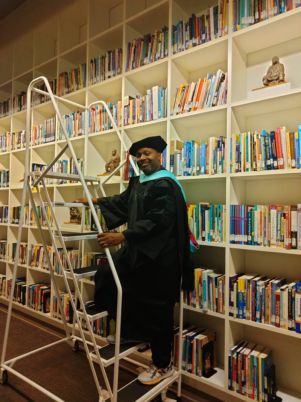CPTC alumnus overcomes odds to earn doctoral degree
Al Brown plans to use his research and lived experience with homelessness to help others.
By Jean Borst
 The number of individuals who go on from a four-year college or university to get a doctorate is small. The number who reach that pinnacle from a two-year institution is even smaller. When the challenges of homelessness are part of the equation, the achievement should simply be unattainable.
The number of individuals who go on from a four-year college or university to get a doctorate is small. The number who reach that pinnacle from a two-year institution is even smaller. When the challenges of homelessness are part of the equation, the achievement should simply be unattainable.
But Al Brown doesn’t believe in impossible. Despite his lack of housing throughout most of his college career, the 2015 graduate of Clover Park Technical College will cross the stage at T-Mobile Park in June to receive his doctoral degree in education from City University of Seattle.
“My education helped me interpret how my circumstances could become a source of meaning for others,” Brown said. “That’s how I sustained my sense of value in the face of adversity.”
Success amid obstacles
When Brown found himself out of work in 2009 after a career as a barber, his early brushes with the law and a suspended driver’s license made it difficult to find employment. And the jobs he did find didn’t pay enough to keep a roof over his head. Despite the obstacles, he knew that getting an education was the answer.
Brown was drawn to the human welfare sector and saw himself as a front-line worker. He decided to attend CPTC where he completed his Associates of Technology in Human Services – typically a 2-year program – in 4 quarters. He then completed his Bachelor of Social Science degree through The Evergreen College in just 11 quarters. A Master of Arts in Leadership from City University followed and led Brown to the Doctor of Education in Leadership program.
It’s a remarkable journey under the best of circumstances. But through most of it, Brown slept in shelters, couch surfed at friends’ homes, lived in a garage, found refuge in his child’s abandoned day care and rented cheap office space. At certain points he secured transitional housing, but that was short-lived. Days before he began his master’s program at CityU, Brown was sleeping on a sidewalk in Tacoma. He finally found permanent housing after he began his doctoral program.
Lived experiences, meaningful research
Through it all, college remained a beacon of hope and purpose. And it opened the door for Brown to use his own experiences to help pave a better path for others.
A class project early in his college career got the wheels turning. Brown had to compile an extensive list of community resources designed for individuals without cell phones and internet service who needed food assistance, housing and other essential services. When Brown found himself in a helpless situation, he thought he had all the information he needed.
“I knew I could lean on the information I collected,” he said. “But I discovered it was incorrect and out of date. I realized how disjointed things are.”
That experience spurred him to do his own research into the incongruities and cracks in a system that is supposed to offer support and resources to those in need.
“Initiatives that seek to explore and explain the region’s diverse problem of homelessness to highlight what is and isn’t working don’t align with my experience or the peer-reviewed data that’s out there,” Brown said. “Homelessness is a complex issue and there are significant gaps in information. My research closes those gaps and offers meaningful and effective approaches to provide support and solutions for homeless individuals.”
The next chapter
As his doctoral graduation approaches, Brown is preparing for his next chapter. He plans to share his research findings and lived experiences through lectures and podcasts, and eventually plans write a book. He would also like to work alongside community leaders and help develop curriculum to share in schools.
As more and more people face homelessness in the region and across the U.S., and the stigmatization, discrimination and significant health issues that come with it, he’s eager to get his message to the forefront.
“When I look out the window of my home, I see some of the same people who were experiencing homelessness when I was,” Brown said. “For someone like me who has fought so hard and will continue to fight, I’m disappointed by how slowly things are moving. In the meantime, people are falling between the cracks. People are dying.”
Brown will also continue to inspire others who are struggling to find a way forward. He offers this advice to those who are starting, or hope to start, their education or career journeys: “Determine what’s holding you back and try to create a new understanding of your values and what you need to succeed,” Brown said. “When I saw the confusion on my kid’s face when he found out my sleeping circumstances, I knew what I had to do.”
Brown welcomes the opportunity to share his research and his personal story. He can be reached at acabrown512@yahoo.com.
Editor’s note: On July 29, 2024, an article in The Seattle Times featured Dr. Brown for his achievements. “Commencement speaker shares journey from homelessness to doctorate.” We are sending you all our congratulations, Dr. Brown!